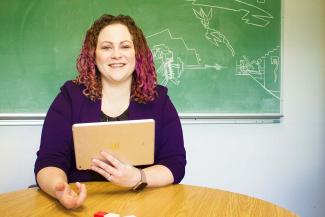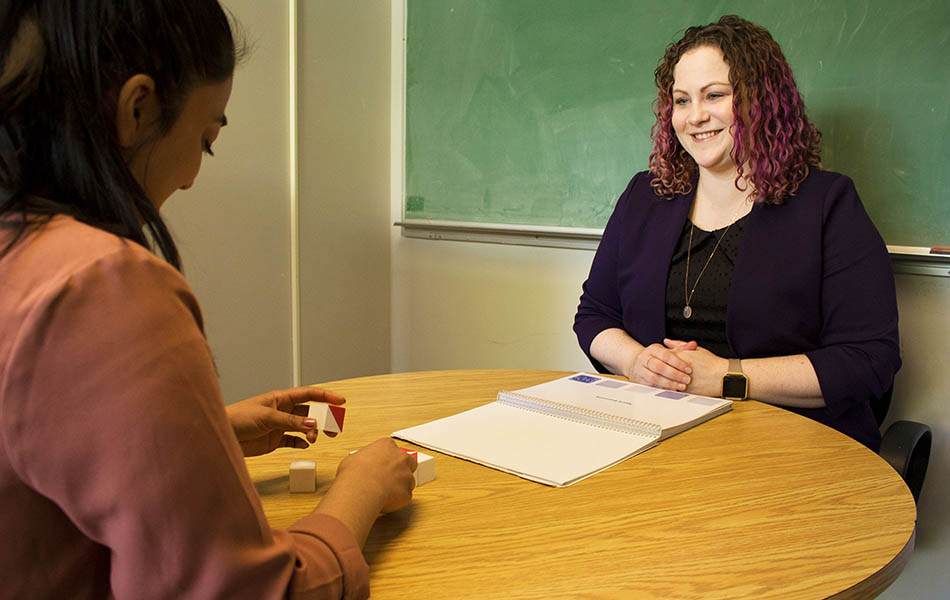Cognitive skills such as learning, planning, and problem solving, are critical for success in life, from making friends and getting good grades in school to having a career or becoming a parent.
These cognitive skills develop as the brain does, so working to improve them early can change the trajectory of a child’s development, Language Sciences member and Educational and Counselling Psychology, and Special Education Instructor Rachel Weber explains.
Your work looks at the development and promotion of cognitive skills in at-risk children – what are cognitive skills, and why are they important?
The cognitive skills I am most interested in are referred to as “higher-order” and include learning, memory, planning, problem solving, and decision making.
They play a major role in determining how we interact with other people and the world, and how we feel and think about those interactions.
We know that these abilities are highly correlated with major life outcomes, from those in childhood and adolescence, like school grades, staying out of trouble, or making and keeping friends, to lifelong goals involving one’s career, parenting, romantic relationships and wellbeing.
We also know that certain areas of the brain are fairly crucial for the operations of higher-order cognition, like the prefrontal cortex, which takes a long time to develop, making this brain region and its connections with other regions quite plastic throughout childhood and adolescence. This means they are highly susceptible to change – both positive and negative. We now know that the neural circuitry involved in higher-order cognition, and the cognitive skills themselves, are malleable for almost all of a person’s first 20+ years of life.
This is really exciting, as it means that there are many opportunities to influence these important abilities, especially now that we know the role they play throughout life.
How does one develop these skills, and promote them?
Brain and cognitive development are determined by both genetic and environmental, as well as epigenetic, processes.
The lives of children and youth who successfully develop cognitive skills are typically full of experiences that involve supportive family and home environments, enriched learning opportunities, and engagement with their peers within the broader community context. Genetics and epigenetics play a role in determining how the brain forms and functions, often in response to these environmental experiences.
In contrast, adverse experiences such as stress, poor parent-child relationships and interactions, lack of access to learning materials or experiences, and community isolation, can negatively impact a child or youth’s developmental trajectory.
Children and youth can be considered ‘at-risk’ for many reasons - most commonly, this risk is related to their medical or psychosocial history, in that this aspect of their background increases the likelihood that they may face challenges with higher-order cognition.
In my field, we aim to identify the experiences or characteristics that increase the likelihood they will struggle so that we can improve our ability to recognize this as early as possible in other children and youth that are similar.

Pictured: Dr. Rachel Weber
How does this work intersect with language?
Several specific environmental experiences have been identified in recent research as likely playing a role in children’s cognitive development, and in explaining the ways in which individuals differ in their development or functioning. One of the most interesting of these experiences, to me, is that of diverse linguistic experience, or multilingual exposure.
Research suggests that diversity in one’s linguistic experience, especially if it leads to bilingual or multilingual proficiency, can enhance some aspects of higher order thinking in individuals of certain age groups.
This is particularly interesting in an area as diverse as Vancouver. Right now, we know that, when comparing children from similar socioeconomic backgrounds, for example, children from bilingual homes tend to perform better on certain higher order cognitive tasks (like those measuring attention and cognitive control).
What projects are you currently working on that address improvement of cognitive development in young people?
One project includes Language Sciences members Janet Werker, Lara Boyd, & Bryan Gick and is investigating the neurocognitive changes associated with postsecondary studies in opera. My work on this project will focus on measuring the cognitive changes these students experience over time as well as to specifically track any learning and academic improvements in opera students with disabilities.
Another project, also in collaboration with Lara Boyd, is evaluating the neurocognitive changes experienced by children and youth who complete a cognitive intervention program (the Arrowsmith program). This program serves students with learning disabilities and challenges by targeting areas of weakness in their cognitive processing in an attempt to improve their academic experiences.
In addition to these projects, I am also working on research that investigates the higher-order cognitive correlates of multi-language exposure in children (not just multilingualism or high dual-language proficiency) and the development of creativity and executive functioning in children and youth with visual impairment.
What do you hope to see in the future for this area of study?
The end goal for research in this area is to improve outcomes for children and youth. This will likely happen through policy change and increased intervention and prevention efforts funded by those policies. In addition, continued research will be necessary as program development and evaluation is always an iterative process.
